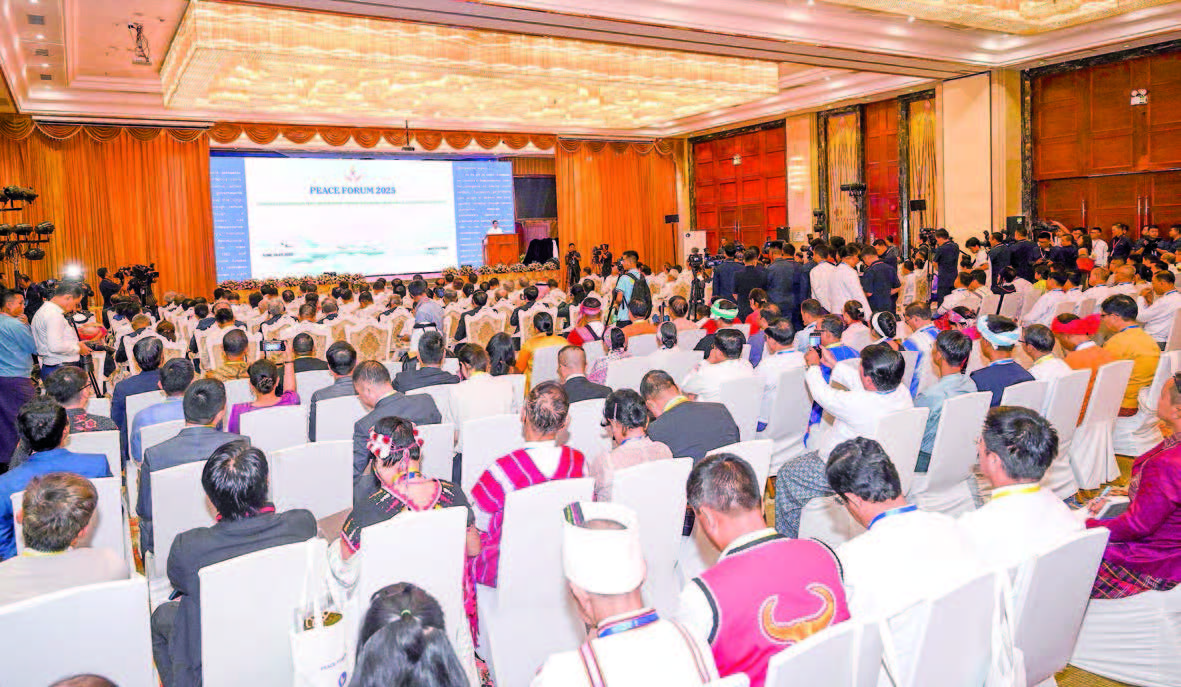Ethnic rights and political demands requiring constitutional amendments will be addressed through the framework of the existing Constitution.
THE opening ceremony of the Peace Forum 2025: Towards the New Nation of Peace and Prosperity through the Integration of Peace, Elections and Development took place at the Mingala Thiri Hotel in Nay Pyi Taw yesterday, with an opening address by Chairman of the State Administration Council Prime Minister Chairman of the National Solidarity and Peacemaking Central Committee Senior General Min Aung Hlaing.
The Senior General and attendees watched a presentation of songs and performances by artistes from the Fine Arts Department under the Ministry of Religious Affairs and Culture with the title of peace in aspiration.
The Senior General delivered an opening speech. (The opening speech delivered by the Senior General is reported separately on page 4.)
In his additional speech, the Senior General said that the ongoing armed conflicts are rooted in political issues and peace-related concerns. At the core of these political issues lie two key components: democracy and federal rights. After gaining independence, our country practised a parliamentary democratic system. Even during that time, Myanmar already had aspirations to adopt a socialist system. This was clearly stated in the independence speech of Myanmar’s first President, Sao Shwe Thaik, who expressed a commitment to practising socialism. Therefore, starting from 1962, the country began implementing a socialist system. After 1988, Tatmadaw initiated preparations to move towards a multiparty democratic path. However, due to the presence of internal armed conflicts, the transition had to be managed cautiously. The current situation has emerged because those armed conflicts have not yet been resolved or ended to this day.
He pledged that the election will be held in December this year and January next year, adding that the government will create opportunities for all eligible voters to cast their votes. Preparations are being made to hold a free and fair election.
The Senior General underscored that ethnic rights and political demands that require amendments to the Constitution will be addressed under the Constitution.
He continued that the outcomes of the peace conferences held under previous governments were compiled into the Union Accord and submitted to the Pyidaungsu Hluttaw. Once the new Hluttaw emerge after elections, this process must be resumed, he noted.
The Senior General explained that outcomes from the Peace Forum will be submitted to the Hluttaw to make decisions. Primarily, individuals need to serve the interest of the State as best as possible with the aspiration for peace.
The Senior General presented gifts to international scholars who are participating in the peace forum and enjoyed a video clip on peace efforts together with attendees.
After the opening ceremony, the Senior General visited the exhibitions to mark the peace forum.
Also, present at the forum were SAC Vice-Chairman Deputy Prime Minister Vice-Senior General Soe Win, Joint Secretary General Ye Win Oo, council members, Union ministers, senior Tatmadaw officers from the Office of the Commander-in-Chief, members of the National Solidarity and Peace Negotiation Committee, retired senior Tatmadaw officers, representatives from Joint Monitoring Committee-JMC, political parties, NCA-signatory ethnic armed organizations, stakeholders of peace process, internal and international intellectuals and intelligentsia, departmental officials, professors from universities, NGOs and INGOs, diplomats and representatives from organizations.
The Peace Forum is being held from 25 to 27 June to support the country’s peace, stability, rule of law, and the successful holding of elections. At the forum, local and international scholars, experts, and participants from various sectors are sharing their perspectives and experiences openly and extensively. The suggestions and recommendations resulting from these discussions will be carried forward and implemented to contribute to peace, elections, and national economic development. — MNA/TTA



